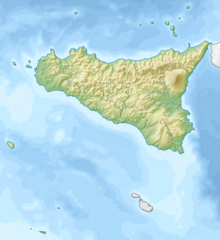| Battle of the Crimissus | |||||||
|---|---|---|---|---|---|---|---|
| Part of The Sicilian Wars | |||||||
 Battle of the Crimissus | |||||||
| |||||||
| Belligerents | |||||||
| Syracuse | Carthage | ||||||
| Commanders and leaders | |||||||
| Timoleon |
Asdrubal Hamilcar | ||||||
| Strength | |||||||
|
Plutarch: 5,000 infantry 1,000 cavalry Diodorus Siculus: 12,000 total |
Polyaenus: 50,000 Diodorus and Plutarch: 70,000 | ||||||
| Casualties and losses | |||||||
| Unknown |
Plutarch: 3,000 Carthaginians 7,000 others 5,000+ prisoners Diodorus Siculus: 2,500 Sacred Band 10,000 others 15,000 prisoners | ||||||
Location within Sicily | |||||||
The Battle of the Crimissus (also spelled Crimisus and Crimesus) was fought in 339 BC between a large Carthaginian army commanded by Asdrubal and Hamilcar and an army from Syracuse led by Timoleon. Timoleon attacked the Carthaginian army by surprise near the Crimissus river in western Sicily (originally it was thought that it was the modern Belice river in southwest Sicily,[1] but it has been recently identified with the modern Freddo river in northwest Sicily[2]) and won a great victory. When he defeated another much smaller force of Carthaginians shortly afterwards, Carthage sued for peace. The peace allowed the Greek cities on Sicily to recover and began a period of stability. However, another war between Syracuse and Carthage erupted after Timoleon's death, not long after Agathocles seized power in 317 BC.
Carthage had tried to prevent Timoleon's arrival on Sicily, where he had been invited by the citizens of Syracuse to depose the Greek tyrants and restore democracy and order. After liberating Syracuse itself, Timoleon sent his mercenaries to raid the Carthaginian territory on western Sicily. Carthage had already gathered a large army, which was moving towards Syracuse in response to the raids.
Vastly outnumbered, Timoleon attacked the Carthaginian army while it was crossing the Crimissus river. The Carthaginians fiercely resisted the initial assault, but a storm which started during the battle worked to the advantage of the Greeks. When the first rank of the Carthaginian army was defeated, the whole army was routed. The Greeks killed or captured many of those who fled and Carthage lost a large number of its wealthiest citizens in the battle.
- ^ Talbert 1974, p. 72.
- ^ Wilson 2000, p. map 47.Sicily.


